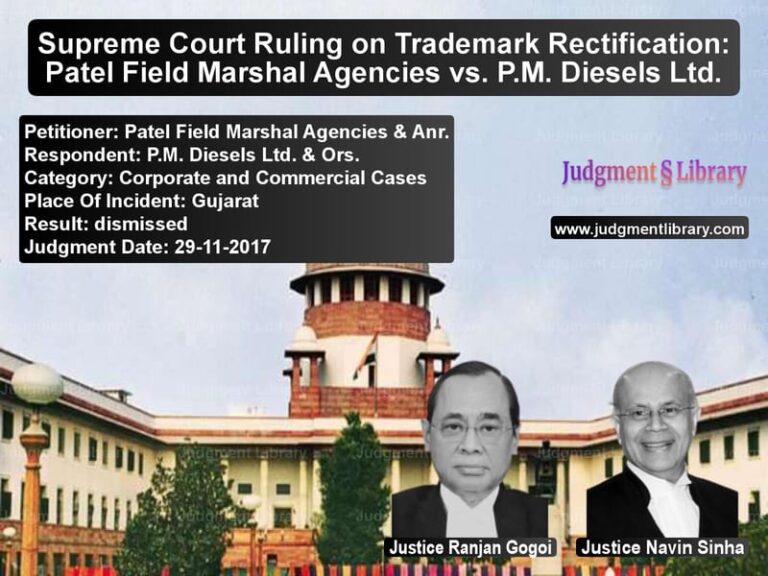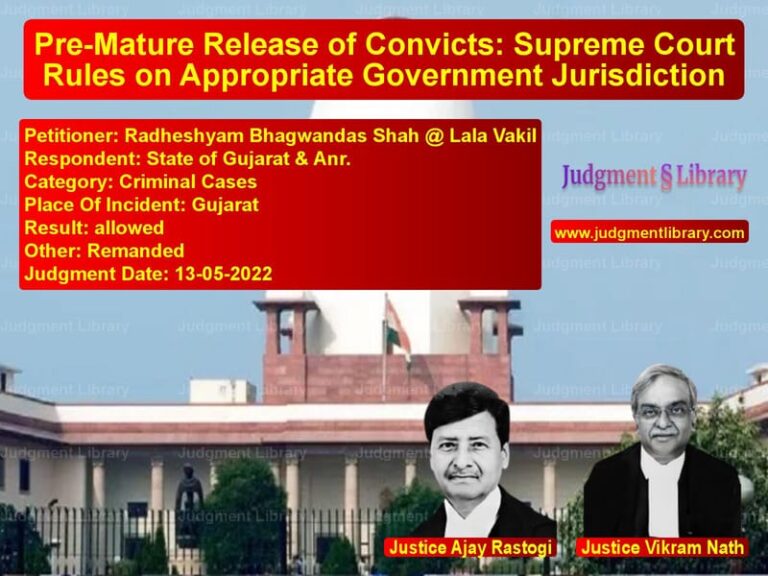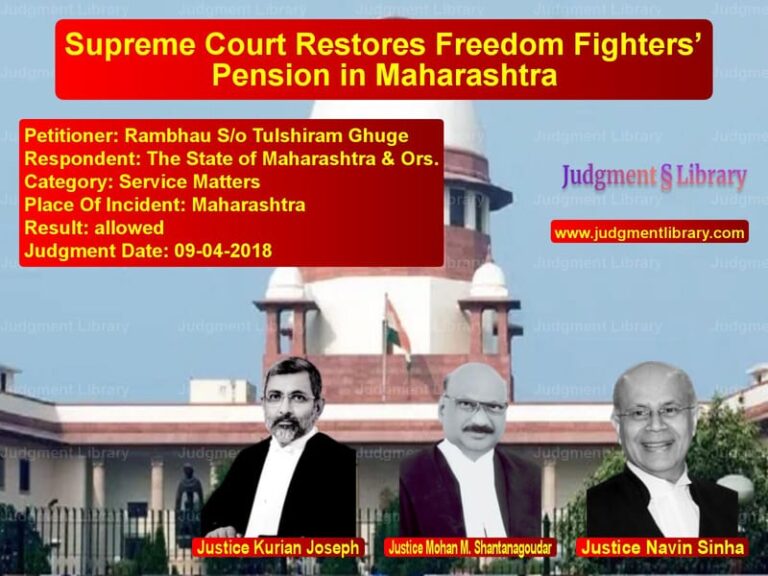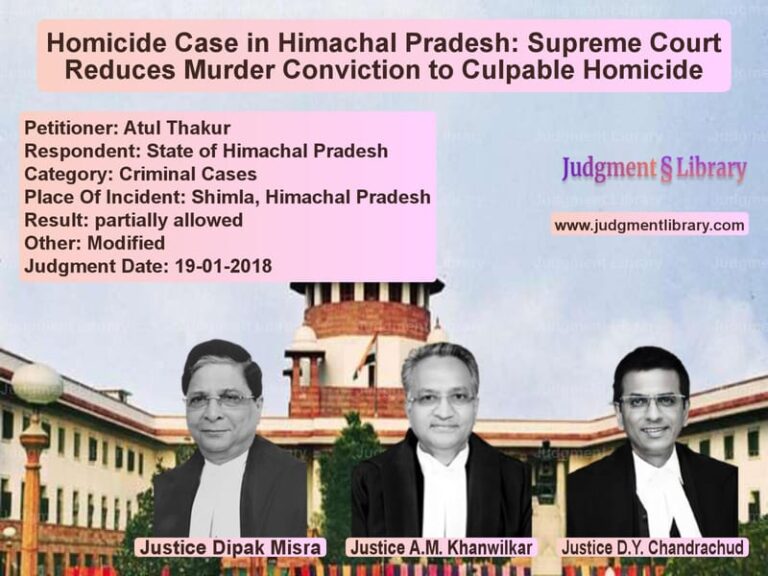Supreme Court Modifies Conviction in Party Murder Case: From Section 302 to Section 304 IPC
The case of Yogesh @ Sonu Tharu & Pradeep Dabas vs. The State revolves around a murder that took place during a party, leading to convictions under Section 302 read with Section 34 of the Indian Penal Code (IPC) along with Sections 25 and 27 of the Arms Act, 1959. The Supreme Court had to decide whether the conviction for murder should be sustained or modified based on the circumstances of the case.
Background of the Case
The case dates back to a party held for the birthday celebration of PW-24, where the accused, Pradeep Dabas (A1) and Yogesh @ Sonu Tharu (A2), along with the deceased, consumed alcohol. A quarrel broke out between A2 and the deceased, escalating into a violent incident. According to the prosecution:
- A1 took a gun and fired at the deceased, but missed.
- A1 then handed the gun to A2, asking him to shoot the deceased.
- A2 did not fire the weapon, and A1 took it back and shot the deceased, leading to his death.
PW-19, a relative of the deceased, was present at the scene and later became the primary witness for the prosecution. The police were informed through PW-20, and an FIR was lodged based on PW-19’s statement.
The Trial Court convicted both accused under Section 302 read with Section 34 IPC, treating the case as murder. The High Court upheld this conviction, leading to the present appeals before the Supreme Court.
Arguments by the Appellants (Yogesh @ Sonu Tharu & Pradeep Dabas)
- The presence of PW-19 was doubtful, as he did not immediately report the crime.
- PW-19’s conduct was unnatural; despite witnessing the incident, he did not intervene or inform the police directly.
- The entire group was under the influence of alcohol, making it a case of sudden provocation rather than premeditated murder.
- A2 did not fire the weapon or encourage A1 to shoot, so he should not be held liable under Section 34 IPC (common intention).
- The weapon was not brought with an intention to kill; the shooting occurred in the heat of the moment.
- The case should be classified as culpable homicide not amounting to murder under Section 304 Part I IPC.
Arguments by the Respondent (State)
- The presence of PW-19 was confirmed through Call Data Records (CDR).
- PW-19’s testimony was corroborated by PW-32 and PW-33.
- The accused ran away from the scene, indicating guilt.
- The use of a firearm demonstrated the intent to kill, justifying the conviction under Section 302 IPC.
Supreme Court’s Analysis and Judgment
The Supreme Court reviewed the evidence and found:
- A2 (Yogesh @ Sonu Tharu) had no direct role in the shooting. The Court ruled that mere presence at the scene was not enough to attract liability under Section 34 IPC.
- The crime was not premeditated. The fight broke out spontaneously while the group was consuming alcohol.
- A1 (Pradeep Dabas) did not arrive at the party intending to kill. The Court ruled that the shooting happened due to a sudden provocation.
- The act fell under Section 299 IPC (culpable homicide not amounting to murder). Since A1 acted on impulse, the Court downgraded the conviction from Section 302 to Section 304 Part I IPC.
The Court ruled:
“The weapon was not brought for the purpose of committing an offense. A1 was carrying the weapon without any intention or objective to commit an offense. But for the quarrel, the occurrence would not have happened.”
Read also: https://judgmentlibrary.com/supreme-court-cancels-bail-of-accused-in-ghaziabad-murder-case/
Supreme Court’s Final Order
- A1’s conviction under Section 302 IPC was modified to Section 304 Part I IPC, with a sentence equivalent to the time already served.
- A2’s conviction was set aside, and he was ordered to be released immediately.
- The conviction and sentence under Section 27 of the Arms Act was upheld.
Legal Implications of the Judgment
This ruling has significant implications for criminal law:
- Common intention (Section 34 IPC) must be proven. Mere presence at the scene does not automatically imply liability.
- Spontaneous acts of violence under the influence of alcohol may be classified as culpable homicide instead of murder.
- Firearm usage does not always justify a murder charge. The intention behind its use must be considered.
- Sentencing should account for mitigating factors, including the absence of premeditation.
Conclusion
The Supreme Court’s decision in this case underscores the principle that criminal liability must be determined based on intention, provocation, and the degree of participation. This ruling sets an important precedent for differentiating between murder and culpable homicide, ensuring that sentencing is proportionate to the nature of the offense.
Read also: https://judgmentlibrary.com/supreme-court-transfers-investigation-of-2013-delhi-murder-case-to-cbi/
Petitioner Name: Yogesh @ Sonu Tharu & Pradeep Dabas.Respondent Name: The State.Judgment By: Justice M.M. Sundresh, Justice S.V.N. Bhatti.Place Of Incident: India.Judgment Date: 04-04-2024.
Don’t miss out on the full details! Download the complete judgment in PDF format below and gain valuable insights instantly!
Download Judgment: yogesh-@-sonu-tharu-vs-the-state-supreme-court-of-india-judgment-dated-04-04-2024.pdf
Directly Download Judgment: Directly download this Judgment
See all petitions in Murder Cases
See all petitions in Bail and Anticipatory Bail
See all petitions in Judgment by M.M. Sundresh
See all petitions in Judgment by S.V.N. Bhatti
See all petitions in partially allowed
See all petitions in Modified
See all petitions in supreme court of India judgments April 2024
See all petitions in 2024 judgments
See all posts in Criminal Cases Category
See all allowed petitions in Criminal Cases Category
See all Dismissed petitions in Criminal Cases Category
See all partially allowed petitions in Criminal Cases Category







